Suds for Schools in Eastbourne
We spent two days with one of the largest primary schools in Europe... Ocklynge Junior School. Teaming up with Forest School Leader Mrs Lynsey Swingler, Our Education Consultant Nick Couzens along with help from Customer Engagement Officer Daniel Jones to deliver flood-prevention and STEM topics to an eager group of Year 4s & 5s. The Blue Heart Project funded scheme was a roaring success, with children asking us for more educational days like this!
- SUDS
- Schools
- Eastbourne
Background about Eastbourne! Why Eastbourne?
Eastbourne in East Sussex is an old coastal town with settlements back as far as the stone age.
This town's unique combination on the coast and low-lying land (at some points below sea level) puts it at risk of both coastal and fluvial (river) flooding.
Eastbourne's topography and densely urbanised areas have led to has many serious flooding events over the years. Intervention in Eastbourne is essential for it to not be heavily impacted by coastal erosion, fluvial flooding & surface water flooding, hence why we are working hard educating the engineers and scientists of the future to help fix these issues.
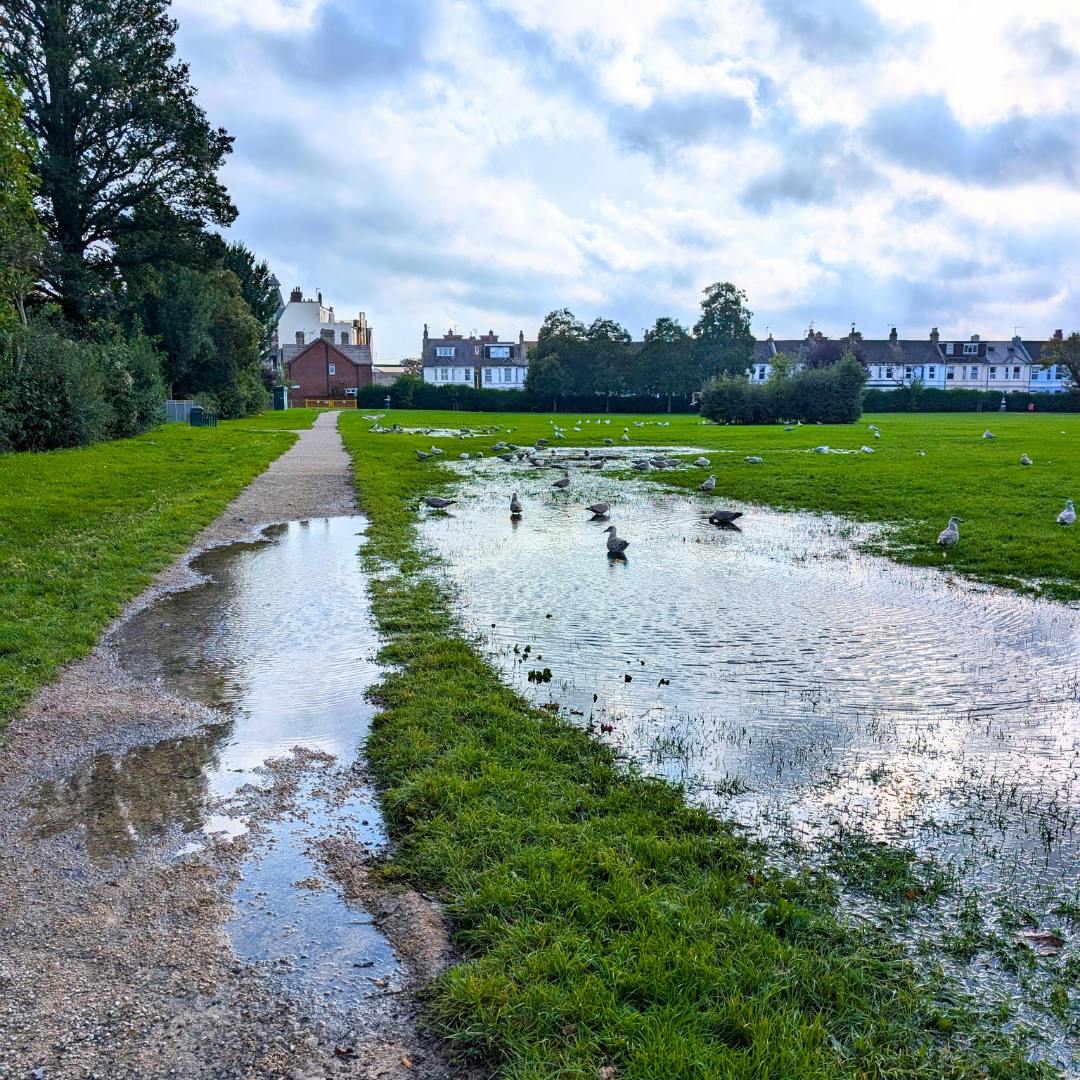
Ocklynge Junior School
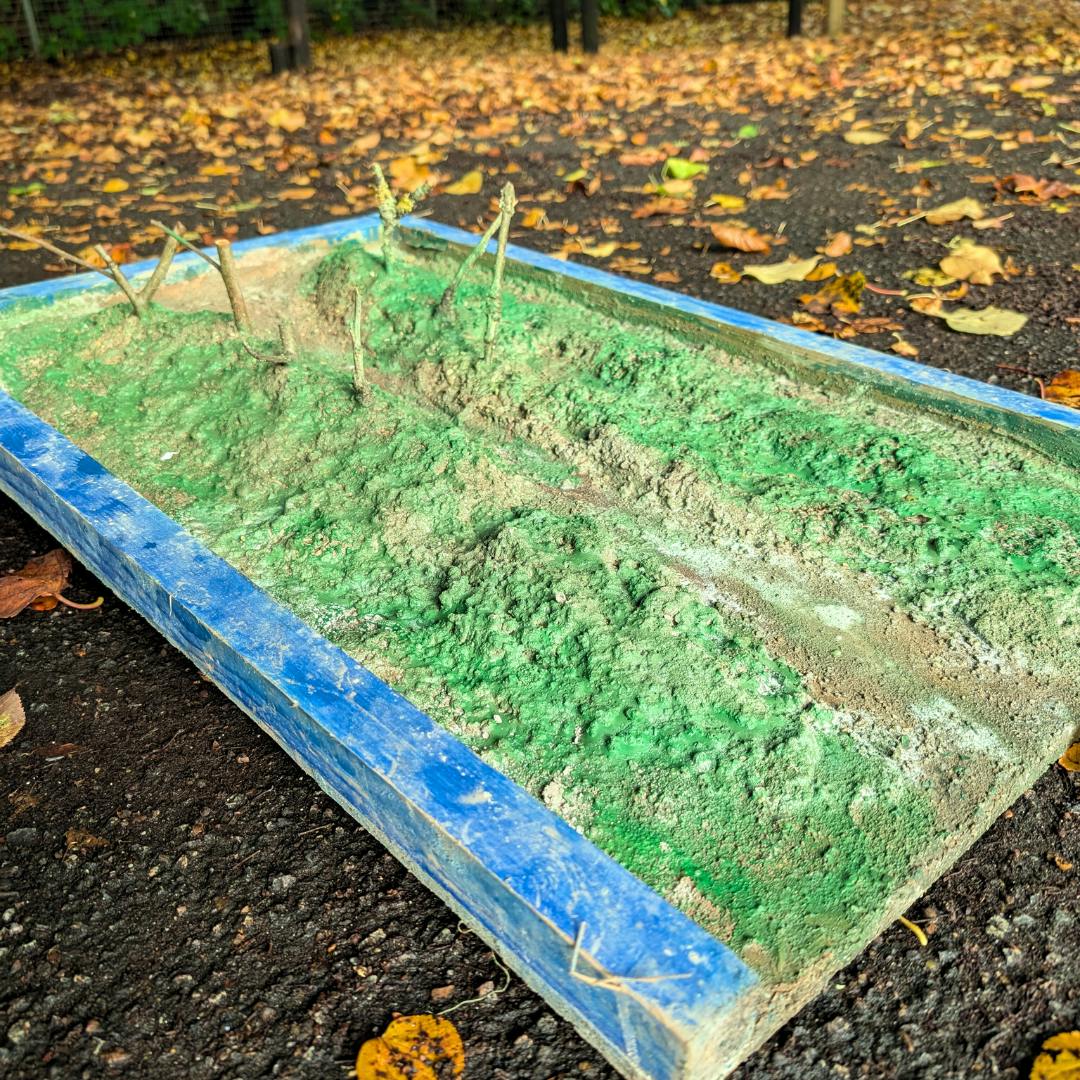
Nick, Daniel and the team from Blue Heart got there early to set up the activities for the children, including a concrete structure that the classes could pour water down to mimic a river, and then use natural solutions to see if they could slow the flow of the water. The children were given a brief indoors introduction to the topic of flooding to get them familiar with the topic before a short morning break. After the morning break the children spent the rest of the morning outdoors, working in teams to direct the flow of water using gutters and to also build dens that would keep them dry from us pouring water over the top.
The students were then taught about the bonds between hydrogen and oxygen atoms and how their structures give way to the unique properties of water. They were then allowed to freely participate in one of 6 different activities at their own leisure and were encouraged to try them all. They learnt about infiltration and surface permeability, redirecting the flow of water, building bridges and even Archimedes screw. We ensured to link these fun activities back to flooding and water to help embed the knowledge and engage them.
The students were then taught about the bonds between hydrogen and oxygen atoms and how their structures give way to the unique properties of water. They were then allowed to freely participate in one of 6 different activities at their own leisure and were encouraged to try them all. They learnt about infiltration and surface permeability, redirecting the flow of water, building bridges and even Archimedes screw. We ensured to link these fun activities back to flooding and water to help embed the knowledge and engage them.
Roselands Infants' School
We delivered another fun day of activities led by our very own Nick Couzens, this time at Roselands Infants School, where we worked with a younger cohort of enthusiastic Year 2's over the two days.
It was a similarly structured day, slightly altered to accommodate for the younger children. The morning was filled with outdoor activities where children slowed the flow of the water like beavers with sticks, learning about the infiltration rate of different surfaces, and built dams to protect houses.
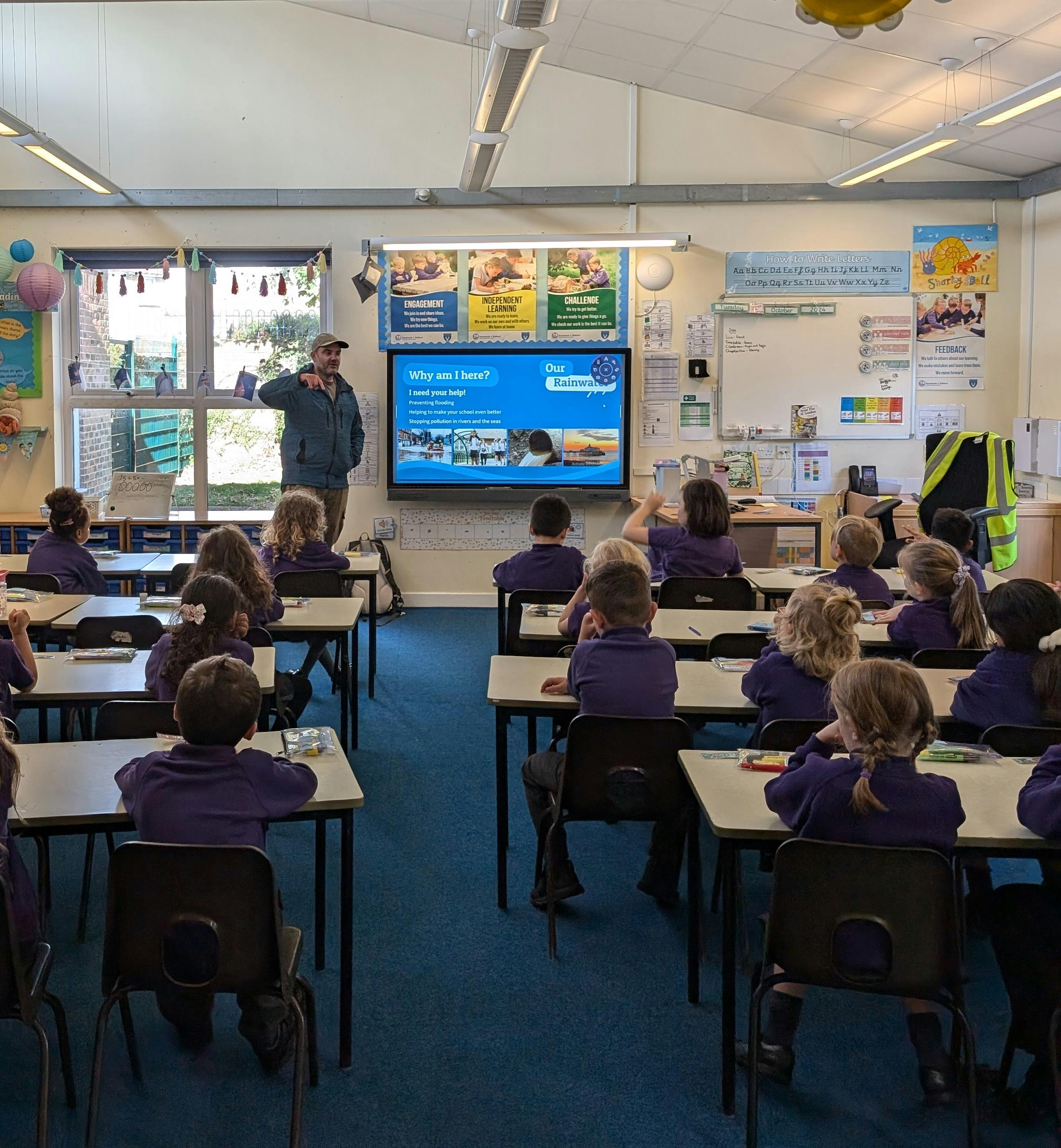
In the afternoon the children then took the knowledge they had learnt into designing their own leaky water butts, we watched the plethora of ideas they came up with. They designed benches around the planters, SuDS systems that could be drawn on, a planter with a hollow section that you could kick a football into that would then roll through (like a water flume) and come out of the bottom as well as systems to provide water for wildlife and plants.
Nick was aided in delivering the lessons by Daniel Jones from Our Rainwater and Tegan Illingworth from The Blue Heart Project. We would also like to give thanks to Mrs Woolley, Miss Durrant, Mrs Sewell, Mrs Childers, Mrs Wallis & Mr Devine who's support was essential in this project.
Using the Childrens design
After lunchtime, the classes were shown how flooding and rainwater ties in with sewage pollution and how we as communities can have an impact on this. They learnt about runoff, gutters, downpipes, sewage and pollution and how sustainable drainage solutions such as 'leaky water butts' can be a force for good as well as the benefits they provide.
They were then asked to design their own leaky rainwater planters for their own school and were told, no idea is too crazy. They used what they had learned that day and applied it to create really interesting concepts that truly no adult would have thought of. Our plan is to incorporate these designs when installing these planters into the school, so that the children can see their hard work pay off.
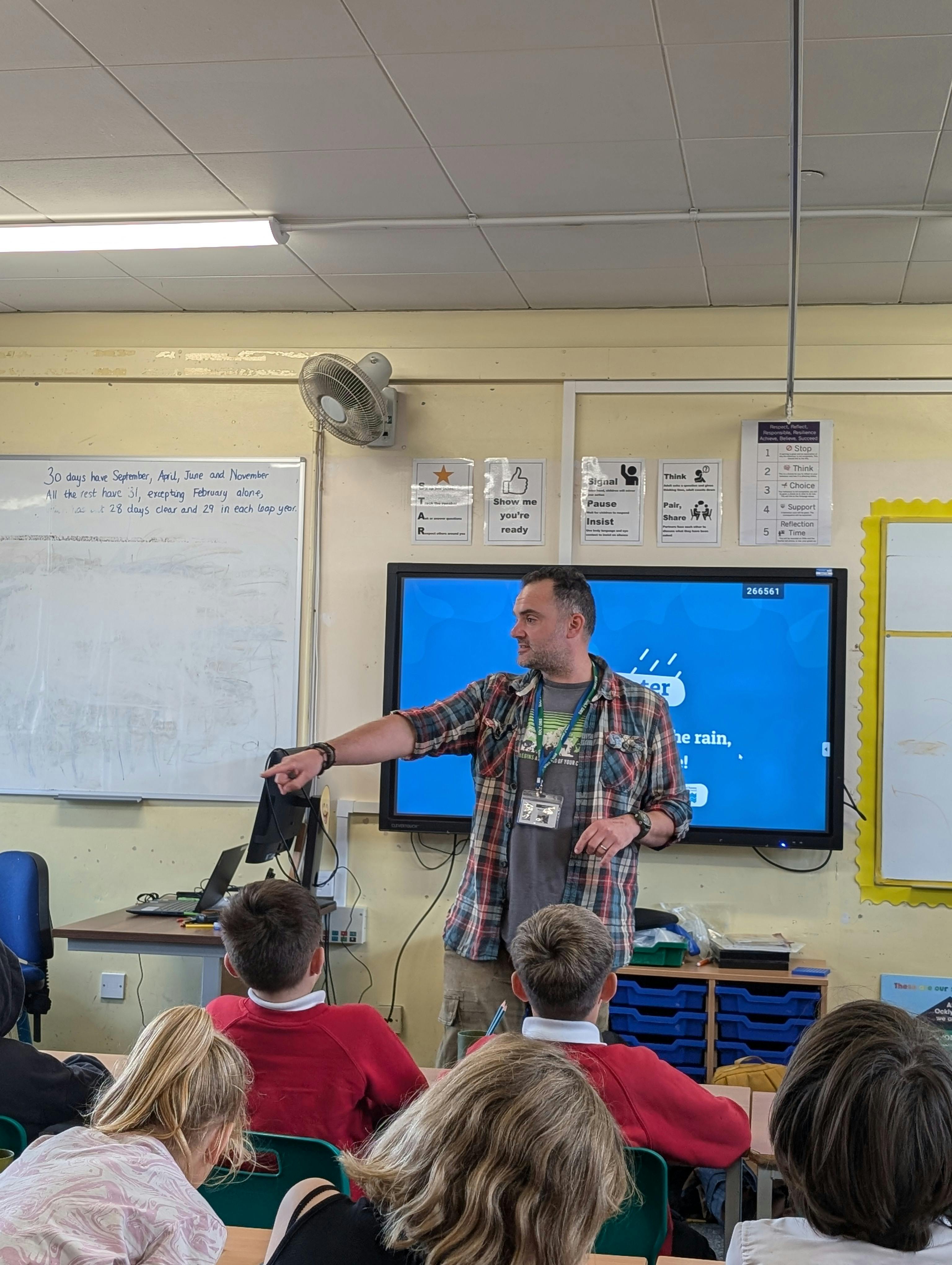
Success
The project was a huge success. The children wanted to do more outdoor activities and were asking us to come back for more sessions. They even thoroughly enjoyed the classroom-based design aspect and were asking for more time to perfect their ideas. They are excited for the next stage of the project and seeing their designs come to fruition, with many saying they have been inspired to become engineers.
Nick
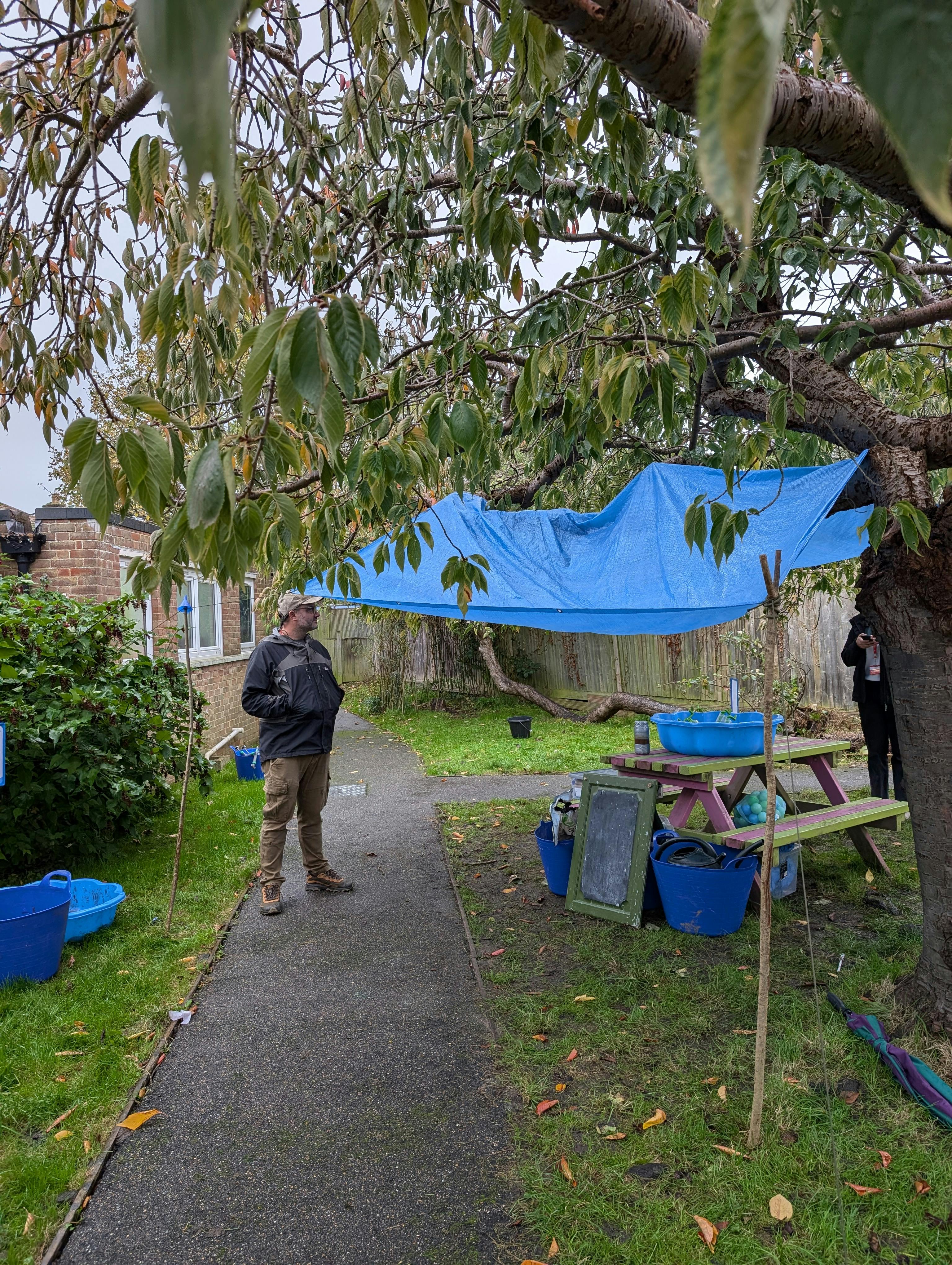
As an outdoor learning instructor, Nick's expertise is invaluable in the success of these projects. Nick prepares concrete structures to simulate a river as well as developing fun and educational classroom content.
His experience as a teacher for 20 years is essential in controlling what is quite rightly, and excited classroom, but it also means that he can tie in the fun exercises in with the classroom learning. Being from Devon, Nick is no stranger to the outdoors, and regularly fashions a canopy out of tarp and other spare parts of his kit, when the weather turns, which it often does in Eastbourne.
Future
We plan on returning and working with more schools in the area (and beyond) to hopefully inspire another generation of thought leaders in the water industry. We also hope to provide education maybe not taught on the curriculum that to us, is essential in tackling the issues we face. Not only that but the children and staff all have fun and find it a positive and memorable experience.
Blue Heart Project
Blue Heart is funded by Defra, as part of the £200 million Flood and Coastal Innovation Programmes, which is managed by the Environment Agency. The programmes will drive innovation in flood and coastal resilience and adaptation to a changing climate.